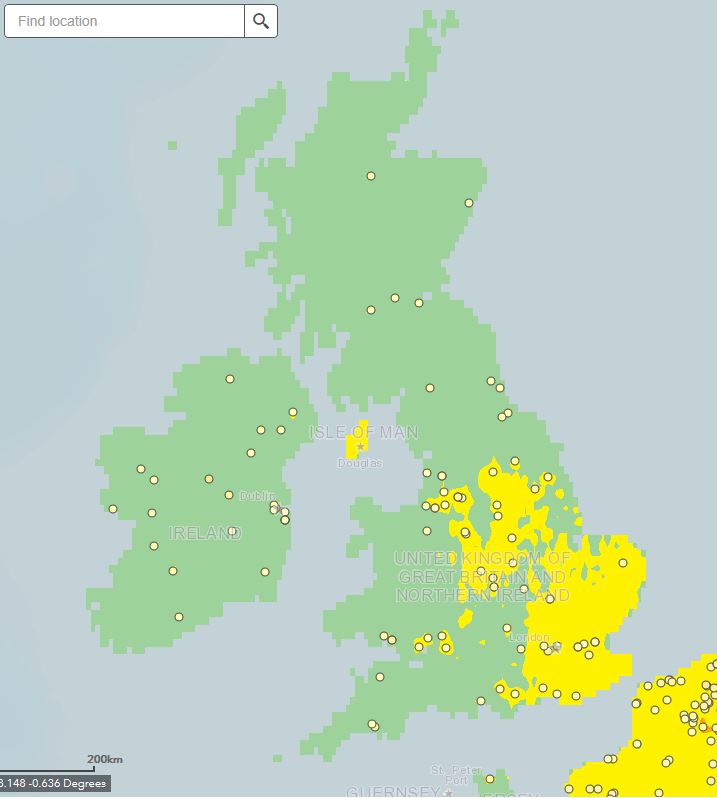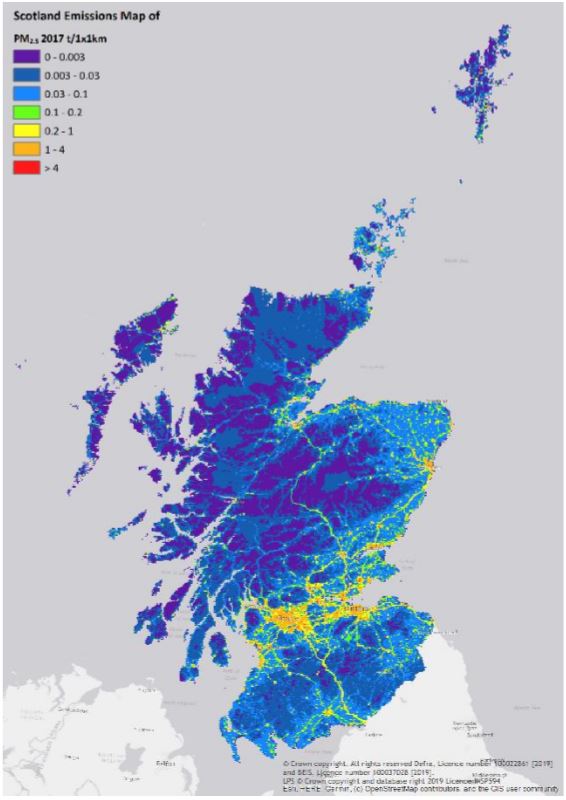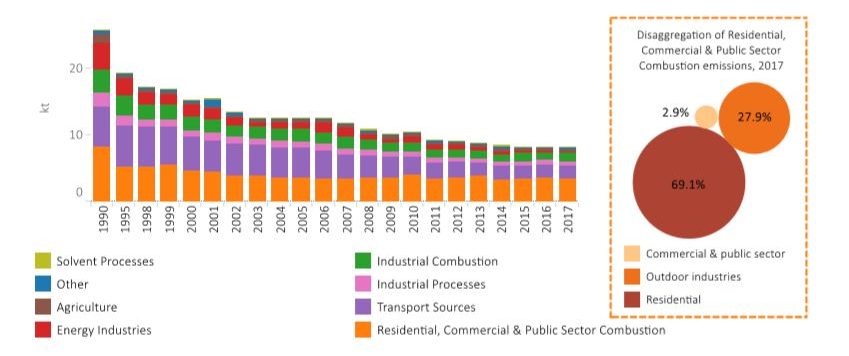The short answer is no.
Recent press coverage has been triggered by the decision to ban the sale of house coal and wet wood in England. It has not been suggested for Scotland. Since you should not be burning wet wood or house coal in a stove anyway, this should not have an impact but it is good to be aware of the ongoing situation.
Air Pollution in the UK
Air pollution, especially from fine particles (PM2.5’s ) that can infiltrate the lungs and bloodstream is a big issue in cities and towns across Britain. The main sources of these particulates are domestic wood and coal burning, industrial combustion, transport and industrial processes.

As you can see the vast majority of the affected areas are in the south of the UK. There is one very small section in Glasgow where figures do exceed 10 annual mean ambient PM2.5’s on this data source but otherwise Scottish records are below this level.
Air Pollution in Scotland
According to the Air Pollutant Inventories for England, Scotland, Wales, and Northern Ireland: 1990-2017 1, levels of PM2.5’s in Scotland have reduced by 68% since 1990. The map below shows the levels measured across Scotland in 2017.

According to the report “Emissions of PM2.5 were estimated to be 8 kilotonnes in 2017, declining by 68% since 1990. These emissions account for 8% of the UK total in 2017. As with PM10, PM2.5 emissions have a large number of significant sources. However, process emissions tend to produce coarser PM fractions and as such, combustion emissions are of greater importance for PM2.5 compared to PM10. For PM2.5, the residential, commercial and public sector combustion category (which includes agricultural combustion and fishing vessels – NFR code 1A4) accounts for 42% of 2017 emissions. The primary drivers for the decline in emissions since 1990 are the switch in the fuel mix used in electricity generation away from coal and towards natural gas, particularly in the early timeseries, and later reductions in emissions from the transport sector due to the introduction of progressively more stringent emissions standards through time. Since 2005, declines in emissions have been offset by increases in emissions from the residential sector, and in particular, the combustion of wood.”
So although the overall trend is very positive, we can see that the increasing contribution made by the burning of wood particularly in homes is a worry.

This trend of households burning wood in open fires or stoves is creating an even greater rise in pollutants in England which has no doubt triggered these proposed changes to legislation.
What is going to happen?
The UK and Scottish Governments have been tackling air pollution for a number of years and it is showing positive results. As one source is reduced they are moving on to target the next one, and this is why stoves and open fires are now under the spotlight, and quite rightly so.
In 2019 the UK Government published its Draft Clean Air Strategy which included the following proposals:
- banning the sale of the most polluting fuels
- only certified clean burn stoves will be available after 2022
- a campaign to educate the public about the environmental and public health impacts of burning
As air pollution is a devolved matter these changes will not directly impact us in Scotland, but it is thought that the Scottish Government may follow suit with similar measures.
Where we will feel an impact is in the stoves that will be available for sale, as UK and European stove manufacturers are already redesigning existing models and creating new models that meet these tighter regulations. These can be recognised by the Ecodesign Ready certification. So this is a benefit as more efficient stoves mean that more of the fuel that you are burning is being converted into heat in the room.
We published an article about this in February 2019 which you can read here: http://backwoodsman-stoves.co.uk/stoves-air-pollution/
Recent proposed ban on polluting fuels
The latest flurry of inaccurate reporting has been due to the proposals to ban sales of house coal and wet wood in England. This will amongst other things stop the sale of small bags of unseasoned wood, and bags of house coal. It won’t stop people buying bulk quantities of logs to then season at home. It is not known if this measure will be implemented by the Scottish Government as well. The situation is summed up well by this article from The Guardian: https://www.theguardian.com/environment/2020/feb/21/coal-wet-wood-how-uk-restrictions-work
Should I still buy a stove?
A stove is an important part of the heating supply for many houses especially in rural areas like ours. The government is not trying to stop this. It is targeting the sources of pollution which are open fires, inefficient and leaky stoves, the burning of house coal and wet wood. So yes, go ahead and buy a stove but make sure that it is efficient. Think about the fuels that you are going to be burning and how you will source and store them. There is more advice about this in our earlier article: http://backwoodsman-stoves.co.uk/stoves-air-pollution/
If you still have concerns or would like some advice then call us up for a chat on 01631 720539.
Further Information
Clean Air Strategy 2019
Stove Industry Alliance (SIA)
HETAS Approved Solid Fuel list
Air Pollutant Inventories for England, Scotland, Wales, and Northern Ireland: 1990-2017
World Health Organisation Global ambient air pollution interactive map

